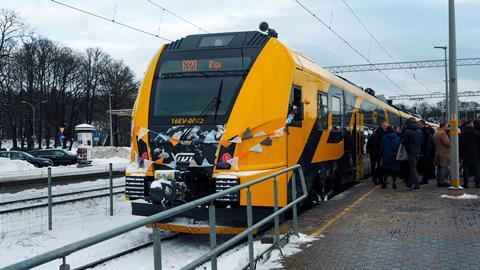
LATVIA: The supervisory board of national passenger operator Pasažieru Vilciens, now branded Vivi, resigned at the end of January, saying they lacked the powers needed to address disruption resulting from faults with new trains.
Sandis Šteins had headed the board since 2016, and resigned along with Inta Liepa and Imants Paeglītis. The replacement board comprises Artis Grinbergs, Artūrs Kokars and Mikus Ozols.
Šteins said there had been a permanent lack of funding for rolling stock renewal, despite constant requests, and drew attention to issues with the condition of the infrastructure needed to run the new Škoda 16EV EMUs .
The first of the 32 EMUs had entered service at the end of 2023. However, 26 defects were identified, preventing reliable operation.
Škoda told Railway Gazette International ‘we are continuously working on the improvement of availability of our trains. We regularly check all the vehicles.’ The manufacturer said the issues mainly involved steps at the doors, horns and cables. The ‘root causes and the solutions of all issues’ had been identified, and were being ixed in Riga by a team of 31 specialists with 24/7 availability. Final delivery of the all the remaining trains is planned by the end of June.
On February 8 PV Chairman Rodžers Jānis Grigulis said ’although the current punctuality of Vivi trains is still above the EU average of 88%, this is not the punctuality we have provided our passengers with and which we aim to regain. We have taken several steps for the stability of the service. In the short term, this means changes in the schedule until Škoda Vagonka guarantees that the trains produced by the company are running without defects. We put the new trains into traffic more cautiously, we plan the movement of the new trains on routes where there are two tracks, and we also use the old trains.’
Transport Minister Kaspars Briškens has ordered an external audit of the procurement, including the specification, acceptance and commissioning processes.
















